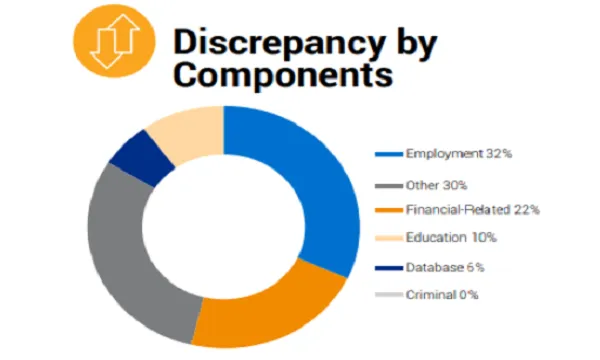
One in three employees lie about their work history: report
The number of employment background checks has dipped 4% since 2016.
Close to one in three or 32% of Singapore employees cover the truth with regards to their work history in their job applications, according to an employment screening trends report by background check firm First Advantage.
Discrepancies in employee applications were found to be rife in Singapore, with close to a third of all applications showing inconsistencies in 2018.
Employment discrepancies were followed by other checks such as CV verification (30%) and financial-related, comprising any negative financial records regarding incidents of bankruptcy, credit, financial regulatory and anti-money laundering, discrepancies at 22%.
As a major financial hub, it is noteworthy that the highest screening priority in Singapore is financial-related checks, accounting for nearly 36% of all checks in the country. Database checks or name checks referenced against various databases including those from media, address listings, passport templates and company registries followed suit, accounting for 21% of background checks in Singapore.
That said, First Advantage noted that the numbers of employment and financial-related checks have both declined in Singapore since 2016, by 4% and 14%, respectively.
Discrepancies for educational checks to verify education and qualification records for an applicant from educational institutions that they state they have attended made up 10% of all inconsistencies in the country.
Whilst the number of education checks increased 2% since 2016, it still only comprised of 9% of all background checks in Singapore. The same rate was found for Singapore’s regional counterpart, Hong Kong, which placed second as the country with the most inconsistencies amongst employment applications (26%).
Japan and Malaysia remained the most stable countries in terms of candidate honesty with differentials of only a few percentage points YoY. And South Korea, although showing a marginal 2% increase from 2017-2018, still boasted the lowest discrepancy rate in the region of just 5%.



![SBR 5 Lorem Ipsum News 2 [8 May]](https://cmg-qa.s3.ap-southeast-1.amazonaws.com/s3fs-public/styles/exclusive_featured_article/public/2025-05/a_hand_pointing_to_a_futuristic_technology_5b87c9d0e3_3.png.webp?itok=M3Hf-9XR)
![SBR 4 Lorem Ipsum [8 May Top Stories]](https://cmg-qa.s3.ap-southeast-1.amazonaws.com/s3fs-public/styles/exclusive_featured_article/public/2025-05/a_hand_pointing_to_a_futuristic_technology_5b87c9d0e3_2.png.webp?itok=2m5Wl0MX)


![Exclusive three SBR 12 Lorem Ipsum [8 May]](https://cmg-qa.s3.ap-southeast-1.amazonaws.com/s3fs-public/styles/exclusive_featured_article/public/2025-05/a_hand_pointing_to_a_futuristic_technology_5b87c9d0e3_11.png.webp?itok=8kn_UIfA)
![SBR 3 Lorem Ipsum [ Exclusive 2]](https://cmg-qa.s3.ap-southeast-1.amazonaws.com/s3fs-public/styles/exclusive_featured_article/public/2025-05/a_hand_pointing_to_a_futuristic_technology_5b87c9d0e3_1.png.webp?itok=YCyjLegJ)
![SBR 2 Lorem Ipsum [8 May]](https://cmg-qa.s3.ap-southeast-1.amazonaws.com/s3fs-public/styles/exclusive_featured_article/public/2025-05/a_hand_pointing_to_a_futuristic_technology_5b87c9d0e3_0.png.webp?itok=_cKD-29o)

![Video [Event News]](https://cmg-qa.s3.ap-southeast-1.amazonaws.com/s3fs-public/styles/event_news_featured_article/public/2025-05/screenshot-2025-05-08-at-4.58.53-pm_0.png.webp?itok=Kud35sMs)
![Event News SBR 9 Lorem Ipsum [8 may]](https://cmg-qa.s3.ap-southeast-1.amazonaws.com/s3fs-public/styles/event_news_thumbnail/public/2025-05/a_hand_pointing_to_a_futuristic_technology_5b87c9d0e3_8.png.webp?itok=DTh_dbYp)
![Event News SBR 9 Lorem Ipsum [8 May]](https://cmg-qa.s3.ap-southeast-1.amazonaws.com/s3fs-public/styles/event_news_thumbnail/public/2025-05/a_hand_pointing_to_a_futuristic_technology_5b87c9d0e3_7.png.webp?itok=vzDAzb6V)
![Event News SBR 8 Lorem Ipsum [8 May]](https://cmg-qa.s3.ap-southeast-1.amazonaws.com/s3fs-public/styles/event_news_thumbnail/public/2025-05/a_hand_pointing_to_a_futuristic_technology_5b87c9d0e3_6.png.webp?itok=jvHFc4P6)
![Video [Event News]](https://cmg-qa.s3.ap-southeast-1.amazonaws.com/s3fs-public/styles/video_thumbnail/public/2025-05/screenshot-2025-05-08-at-4.58.53-pm_0.png.webp?itok=yZnI0YBb)
![Video 1 SBR [8 May]](https://cmg-qa.s3.ap-southeast-1.amazonaws.com/s3fs-public/styles/video_thumbnail/public/2025-05/screenshot-2025-05-08-at-4.58.53-pm.png.webp?itok=9AAeRz_k)

 Advertise
Advertise

